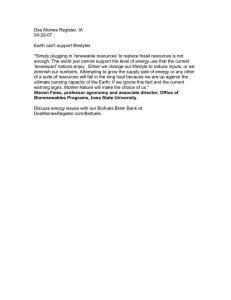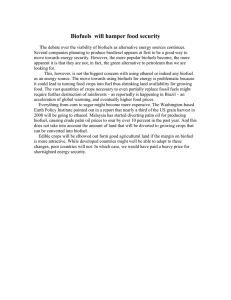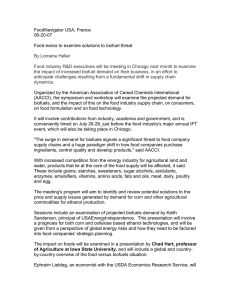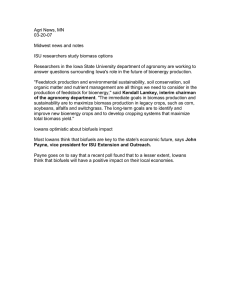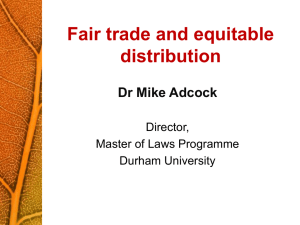Energy Security, Biofuels and Food Supply What are biofuels?
advertisement
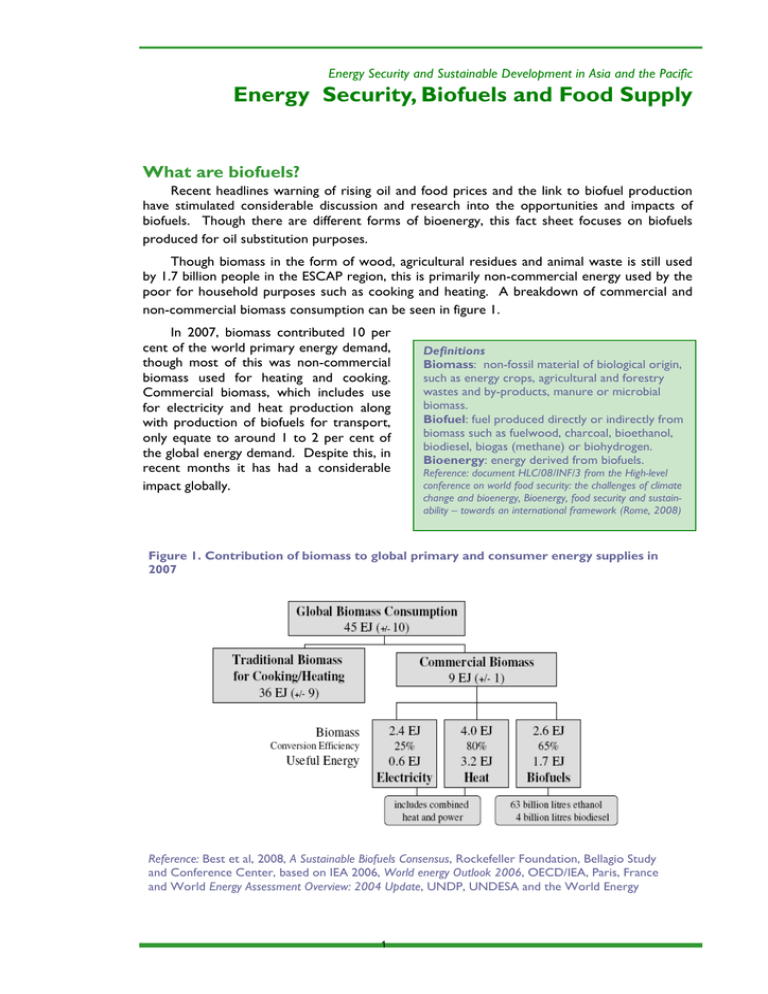
Energy Security and Sustainable Development in Asia and the Pacific Energy Security, Biofuels and Food Supply What are biofuels? Recent headlines warning of rising oil and food prices and the link to biofuel production have stimulated considerable discussion and research into the opportunities and impacts of biofuels. Though there are different forms of bioenergy, this fact sheet focuses on biofuels produced for oil substitution purposes. Though biomass in the form of wood, agricultural residues and animal waste is still used by 1.7 billion people in the ESCAP region, this is primarily non-commercial energy used by the poor for household purposes such as cooking and heating. A breakdown of commercial and non-commercial biomass consumption can be seen in figure 1. In 2007, biomass contributed 10 per cent of the world primary energy demand, though most of this was non-commercial biomass used for heating and cooking. Commercial biomass, which includes use for electricity and heat production along with production of biofuels for transport, only equate to around 1 to 2 per cent of the global energy demand. Despite this, in recent months it has had a considerable impact globally. Definitions Biomass: non-fossil material of biological origin, such as energy crops, agricultural and forestry wastes and by-products, manure or microbial biomass. Biofuel: fuel produced directly or indirectly from biomass such as fuelwood, charcoal, bioethanol, biodiesel, biogas (methane) or biohydrogen. Bioenergy: energy derived from biofuels. Reference: document HLC/08/INF/3 from the High-level conference on world food security: the challenges of climate change and bioenergy, Bioenergy, food security and sustainability – towards an international framework (Rome, 2008) Figure 1. Contribution of biomass to global primary and consumer energy supplies in 2007 Reference: Best et al, 2008, A Sustainable Biofuels Consensus, Rockefeller Foundation, Bellagio Study and Conference Center, based on IEA 2006, World energy Outlook 2006, OECD/IEA, Paris, France and World Energy Assessment Overview: 2004 Update, UNDP, UNDESA and the World Energy 1 Presently, ethanol and biodiesel are the most important biofuels. These are produced from different plants such as sugar cane, palm oil jatropha and soybean oil and are considered “first-generation” because the crops are grown specifically for the purpose of transformation into these fuels. “Second-generation” biofuels are not commercially viable at this stage though have the potential to increase energy yields and reduce environmental impacts significantly. “Second-generation” production involves using waste materials and transforming it into oil products through different processes such as gasification, which involves the combustion of materials in the absence of oxygen. The growth in biofuels production has been stimulated mostly by the rising fossil fuel prices, agricultural feedstock prices and national policies for the purpose of energy security, climate change mitigation and rural development. Agricultural and energy markets are closely linked since agriculture both produces and consumes energy. Therefore, the rise in energy prices has had a large impact on the rise in agricultural commodity prices. This has provided an opportunity for some farmers who have generated more income by switching to fuel crops; however the change from food crops has adversely impacted the food prices as well. However, the link between biofuels production and food security is complex and should not be made directly. Food security and biofuels Food security relates more to people’s access to food rather than whether there is enough food available to feed the world. Overall, food security will be affected differently for different people. There are four factors that encompass the issue of food security: • Availability of food relates to agricultural production of food crops. This can be threatened by a diversion of food production to biofuels production, though this hinges on factors such as the crop selection, farming techniques, agricultural yields and the development of new technologies. In some instances, biofuels markets may stimulate new investment in agriculture research and infrastructure development, possibly leading to improved food production. • Access to food primarily refers people’s ability to afford and overcome barriers such as remoteness and social marginalization. Food prices and income level are the main factor related to access. Food prices can increase due to resource competition. Alternatively, farmers could benefit from these higher prices, and bioenergy growth could revitalize agriculture and create employment opportunities. • Stability of food refers to events that may lead to populations losing access to food such as conflict, loss of resources, market failure, environmental degradation and disasters. The diversion of food crops to biofuels could indirectly increase the volatility of food prices and will particularly impact vulnerable countries if their food import dependency increases to cover the food deficit. • Utilization of food refers to people’s ability to absorb the nutrients within the food. Biofuels can affect people’s health if its production competes for water. Alternatively, smallscale biofuels production may reduce the reliance on other traditional fuels such as wood, which would provide more time for other activities, particularly for women and children, and reduce the health risk of using traditional fuels. 2 Biofuels and sustainable development Economic The economic production of biofuels is linked to the scale and method of production. In considering the economic viability, however, the indirect environmental and social impacts must be considered. If new technologies and practices are introduced in isolation of broader development policies they can have a negative affect on other areas which would have a longer-term economic cost related to social instability, environmental degradation and health. Despite the potential negative impacts of biofuels, much can be learnt from its recent growth as considerable coordination between governments, investors and the car industry would have been required to develop the industry to be commercial. Many lessons could be learnt on for the purpose of expanding the use of other renewable energy technologies such as solar and wind energy. Social Food security is one of the core factors related to biofuels and social impacts. These impacts were discussed in the last section. The production of biofuels presents an opportunity for income for agricultural producers including small land-holders. However, evidence suggests that the income benefits the male household members disproportionately. In addition, large scale production such as ethanol which requires economies of scale to be profitable may displace vulnerable households if land tenure is insecure. This kind of production also tends not to benefit the landless as much. Though employment opportunities may be available, labourrights and conditions may not be of an acceptable high standard and the trend to mechanize the production reduces employment opportunities. On the small scale of a farm or community could provide access to energy and revitalize rural economies by improving mechanization, irrigation and transport. Biofuel production also provides by-products that can be used as fertilizers and to feed livestock. Environmental Biofuels affect the environmental pillar in several ways that can be positive or negative depending on the agricultural methods employed. One of the key factors driving biofuels is the potential to mitigate climate change, however, this varies broadly depending on the technologies used, the location and production methods. The key sources of carbon emissions are land conversion, mechanization, fertilizer use, and the use of fossil fuels for processing and transport. The removal of land with a high carbon content and biodiversity, such as forests or peat land would immediately result in a negative carbon balance that would take years to offset through growing crops. The threat of biodiversity loss is also related to land-use change, though extensive monoculture biofuel production could also affect agricultural biodiversity. Many crops are also highly water intensive which could create an even greater competition for an already scarce resource. Ideally, these issues may produce positive results with good agricultural practices and strong policies to protect land of a high biodiversity. A full life-cycle assessment is required to fully consider whether the production of biofuels would create a net positive climate mitigation impact. 3 The cost of food: facts and figures 4 Rising oil prices and fears over climate change have seen a massive rise in the use of maize to make bio-fuels, pushing up food prices There will be billions more mouths to feed by 2050, making an increased demand for food a long-term trend 5 Rising prices will improve the trade balance of major food exporters, but major importers stand to see a greater deficit 6 Declaration of the High-Level Conference on World Food Security: the Challenges of Climate Change and Bioenergy Given the global debate on biofuels and their link to rising food and energy prices, a global meeting was organized by FAO in Rome from 3 to 5 June 2008 to discuss how these issues can be dealt with at the international and national levels. Attendees included Heads of State and Government and Ministers dealing with agriculture, livestock, forestry, fisheries, water, energy and environment, along with the heads of UN agencies and selected inter-governmental and non-governmental organizations. The earlier discussion highlighting the positive and negative aspects of biofuels primarily originates from the background document to this meeting. Possible global policy options and strategies discussed included a “business as usual” scenario where current national activities continue unabated, a “moratorium” scenario where all production of biofuels is temporarily prohibited, and an “intergovernmental consensus-building on sustainable biofuels” scenario which recommends the development of an internationally agreed approach to consider the issues and develop biofuels in a sustainable manner. The “intergovernmental consensus-building on sustainable biofuels” scenario was adopted during this meeting as a declaration by all participants. The strategies included the development and support of sustainable agriculture systems; however the primary measure recommended with regard to biofuels was: “7f) It is essential to address the challenges and opportunities posed by biofuels, in view of the world’s food security, energy and sustainable development needs. We are convinced that in-depth studies are necessary to ensure that production and use of biofuels is sustainable in accordance with the three pillars of sustainable development and takes into account the need to achieve and maintain global food security. We are further convinced of the desirability of exchanging experiences on biofuels technologies, norms and regulations. We call upon relevant inter-governmental organizations, including FAP, within their mandates and areas of expertise, with the involvement of national governments, partnerships, the private sector, and civil society, to foster a coherent, effective and results-oriented international dialogue on biofuels in the context of food security and sustainable development needs.” 7 Messages from different political figures related to energy security, biofuel and food supply Secretary General of the United Nations “The reasons for the crisis are many and cannot be solely ascribed, as some do, to a simple tradeoff between biofuels and agriculture. High oil prices have increased production and transport costs. Worldwide food production has been affected this year by droughts and other natural disasters. Economic growth has increased consumption, especially in Asia. Financial speculation and the prolonged fall of the United States dollar may also be factors.” SG’s remarks to the opening of the twelfth United Nations Conference on Trade and Development (UNCTAD) yesterday, 20 April, in Accra, Ghana Secretary General of the United Nations The rapidly escalating crisis of food availability around the world has reached emergency proportions. […..] We need not only short-term emergency measures to meet urgent critical needs and avert starvation in many regions across the world, but also a significant increase in long-term productivity in food grain production. As Robert Zoellick said last week the crisis could mean “seven lost years” in the fight against worldwide poverty. SG’s address to the special high-level meeting of the Economic and Social Council with the Bretton Woods institutions, the World Trade Organization and the United Nations Conference on Trade and Development in New York, 14 April Mr. Samak Sundaravej, Prime Minister of Thailand The premier lashed out at international agencies, which he said were unfairly blaming biofuel producers for the spike in rice prices while saying little about the impact of skyrocketing crude oil prices. “They cannot put the blame on us,” he said. “Why doesn’t somebody investigate the price of oil? Why only the price of rice?” Higher oil prices, he said, had pushed up sharply the cost of fertiliser and other farming inputs. “When it comes to the cost of growing rice, for farmers it is much more,” he said. The Financial Times, 22 April 2008 Mr. Yasuo Fukuda, Prime Minister of Japan In a letter to his G8 colleagues that soaring food prices were posing “imminent and serious” global challenges. “Threat of hunger and malnutrition is increasing, and the high prices have also brought about social unrest,” he said. Mr Fukuda’s missive came after Gordon Brown, UK prime minister, urged his Japanese counterpart in a letter to put the food crisis on the G8 agenda The Financial Times, 21 April 2008 Ms. Angela Merkel, Chancellor of Germany She said today in Freiberg, during a visit to a biofuel plant , that soaring prices for rice, milk and other staple foods are not related to global demand for biofuels, and can instead be ascribed to growing affluence in developing countries The Financial Times , 17 April 2008 Mr. Luiz Inacio Lula da Silva, President of Brazil The Brazilian president has rejected criticism that his country's production of biofuels has forced a surge in global food prices and harms the environment. He accused critics of being driven by economic and political interests, and failing to highlight soaring oil prices and increased demand as a factor in pushing up food production costs. Guardian, 17 April 2008 Jean Ziegler, United Nation’s Special Rapporteur for the Right to Food Jean Ziegler has condemned the growing use of crops to produce biofuels as a replacement for petrol as a crime against humanity BBC News, 27 October 2007 8 DECLARATION OF THE HIGH-LEVEL CONFERENCE ON WORLD FOOD SECURITY: THE CHALLENGES OF CLIMATE CHANGE AND BIOENERGY WE, the Heads of State and Government, Ministers and Representatives of 180 countries and the European Community, have met in Rome at this High-Level Conference convened by the Food and Agriculture Organization of the United Nations, together with the United Nations World Food Programme, the International Fund for Agricultural Development and Bioversity International on behalf of the CGIAR system, to seek ways of achieving world food security and, in this context, to address challenges of higher food prices, climate change and bioenergy. 1. We reaffirm the conclusions of the World Food Summit in 1996, which adopted the Rome Declaration on World Food Security and the World Food Summit Plan of Action, and the objective, confirmed by the World Food Summit: five years later, of achieving food security for all through an ongoing effort to eradicate hunger in all countries, with an immediate view to reducing by half the number of undernourished people by no later than 2015, as well as our commitment to achieving the Millennium Development Goals (MDGs).We reiterate that food should not be used as an instrument for political and economic pressure. We also recall the Voluntary Guidelines to Support the Progressive Realization of the Right to Adequate Food in the Context of National Food Security. We reiterate that it is unacceptable that 862 million people are still undernourished in the world today. 2. We are here to address the challenges of bioenergy and climate change, and the current situation of soaring food prices that is having adverse impacts on food security, particularly in developing countries and countries in transition, all the more because the indications are that food prices will remain high in the years to come. 3. We are convinced that the international community needs to take urgent and coordinated action to combat the negative impacts of soaring food prices on the world’s most vulnerable countries and populations. We are further convinced that actions by national governments, with the support of the international community, are required in the short, medium-and longterm, to meet global and household food security needs. There is therefore an urgent need to help developing countries and countries in transition expand agriculture and food production, and to increase investment in agriculture, agribusiness and rural development, from both public and private sources. In adopting this Declaration, we pledge to embrace food security as a matter of permanent national policy, renew our commitment to achieving the World Food Summit objectives and the Millennium Development Goals, and commit ourselves to the following measures. Immediate and Short-Term Measures 4. The global food situation calls for a strong commitment from governments as well as from all other stakeholders. We call upon all donors and the United Nations System to increase their assistance for developing countries, in particular least developed countries and those that are most negatively affected by high food prices. In the immediate future it is essential to proceed along two main lines. 5. The first line of action is to respond urgently to requests for assistance from affected countries. 9 a) The relevant United Nations agencies should be assured the resources to expand and enhance their food assistance and support safety net programmes to address hunger and malnutrition, when appropriate, through the use of local or regional purchase. b) The appropriate regional organizations which have emergency food security arrangements should enhance their cooperation with a view to effectively cope with soaring food prices. c) All efforts by governmental and non-governmental organizations to strengthen immediate humanitarian and development assistance should be synergized with those of the multilateral organizations, and made coherent, to deal with the continuum from urgent to longer term assistance. d) All national and international efforts should be made to ensure that international emergency food assistance is delivered as quickly and efficiently as possible to populations in distress. e) To facilitate adjustment to higher food prices, donors and international financial institutions, in accordance with their mandates and in consultation with recipient countries, should provide in a timely manner, balance of payments support and /or budget support to food-importing, low-income countries. Other measures should be considered as necessary to improve the financial situation of the countries in need, including reviewing debt servicing as necessary. We also call on the relevant international institutions to simplify the eligibility procedures of existing financial mechanisms to support agriculture and environment. 6. The second line of action is immediate support for agricultural production and trade. a) All relevant organizations and cooperating countries should be prepared to assist countries, on their request, to put in place the revised policies and measures to help farmers, particularly small-scale producers, increase production and integrate with local, regional, and international markets. South-south cooperation must be encouraged. b) Development partners are invited to participate in and contribute to international and regional initiatives on soaring food prices and, in particular, under the FAO initiative launched on 17 December 2007, in support of country-led measures to give farmers in low-income food-deficit and the most affected countries access to appropriate locally adapted seeds, fertilizers, animal feed and other inputs, as well as technical assistance, in order to increase agricultural production. c) Development partners are called upon to undertake initiatives to moderate unusual fluctuations in the food grain prices. In particular, we call on relevant institutions to assist countries in developing their food stock capacities and consider other measures to strengthen food security risk management for affected countries. d) Members of WTO reaffirm their commitment to the rapid and successful conclusion of the WTO Doha Development Agenda and reiterate their willingness to reach comprehensive and ambitious results that would be conducive to improving food security in developing countries. Implementing an aid for trade package should be a valuable complement to the Doha Development Agenda to build and improve the trading capacity of the developing countries. e) We will strive to ensure that food, agricultural trade and overall trade policies are conducive to fostering food security for all. For this purpose we reaffirm the need to minimise the use of restrictive measures that could increase volatility of international prices. 10 Medium and Long-Term Measures 7. The current crisis has highlighted the fragility of the world’s food systems and their vulnerability to shocks. While there is an urgent need to address the consequences of soaring food prices, it is also vital to combine medium and long-term measures, such as the following: a) We urge national governments, all financial institutions, donors and the entire international community to fully embrace a people-centred policy framework supportive of the poor in rural, peri-urban and urban areas and people’s livelihoods in developing countries, and to increase investment in agriculture. b) It is essential to address the fundamental question of how to increase the resilience of present food production systems to challenges posed by climate change. In this context, maintaining biodiversity is key to sustaining future production performance. We urge governments to assign appropriate priority to the agriculture, forestry and fisheries sectors, in order to create opportunities to enable the world’s smallholder farmers and fishers, including indigenous people, in particular in vulnerable areas, to participate in, and benefit from financial mechanisms and investment flows to support climate change adaptation, mitigation and technology development, transfer and dissemination. We support the establishment of agriculture systems and the sustainable forest management practices that positively contribute to the mitigation of climate change and ecological balance. c) In addition, we reaffirm the Mauritius Strategy for the sustainable development of small island developing states and call for its implementation in the context of the challenges of climate change and food security. d) We urge the international community, including the private sector, to decisively step up investment in science and technology for food and agriculture. Increased efforts in international cooperation should be directed to researching, developing, applying, transferring and disseminating improved technologies and policy approaches. We urge member states, to establish in accordance with the Monterrey Consensus, governance and policy environments which will facilitate investment in improved agricultural technologies. e) We encourage the international community to continue its efforts in liberalizing international trade in agriculture by reducing trade barriers and market distorting policies. Addressing these measures will give farmers, particularly in developing countries, new opportunities to sell their products on world markets and support their efforts to increase productivity and production. f) It is essential to address the challenges and opportunities posed by biofuels, in view of the world’s food security, energy and sustainable development needs. We are convinced that in-depth studies are necessary to ensure that production and use of biofuels is sustainable in accordance with the three pillars of sustainable development and takes into account the need to achieve and maintain global food security. We are further convinced of the desirability of exchanging experiences on biofuels technologies, norms and regulations. We call upon relevant intergovernmental organizations, including FAO, within their mandates and areas of expertise, with the involvement of national governments, partnerships, the private sector, and civil society, to foster a coherent, effective and results-oriented international dialogue on biofuels in the context of food security and sustainable development needs. 11 Monitoring and Review 8. We request the Food and Agriculture Organization of the United Nations, in close partnership with WFP and IFAD and other relevant international organizations, including those participating in the High-Level Task Force on the Global Food Crisis and in collaboration with governments, civil society and the private sector, to monitor and analyse world food security in all its dimensions -including those addressed by this Conference -and to develop strategies to improve it. 9. In realizing the contents of the measures above, we stress the importance of the effective and efficient use of the resources of the United Nations system, and other relevant international organizations. *** We firmly resolve to use all means to alleviate the suffering caused by the current crisis, to stimulate food production and to increase investment in agriculture, to address obstacles to food access and to use the planet’s resources sustainably, for present and future generations. We commit to eliminating hunger and to securing food for all today and tomorrow. Rome, 5 June 2008 This Declaration was adopted by the High-Level Conference on World Food Security: the Challenges of Climate Change and Bioenergy, on 5 June 2008. On the adoption of the Declaration, statements were made by Argentina, Cuba and Venezuela, which will be included in the Report of the High-Level Conference. 12
